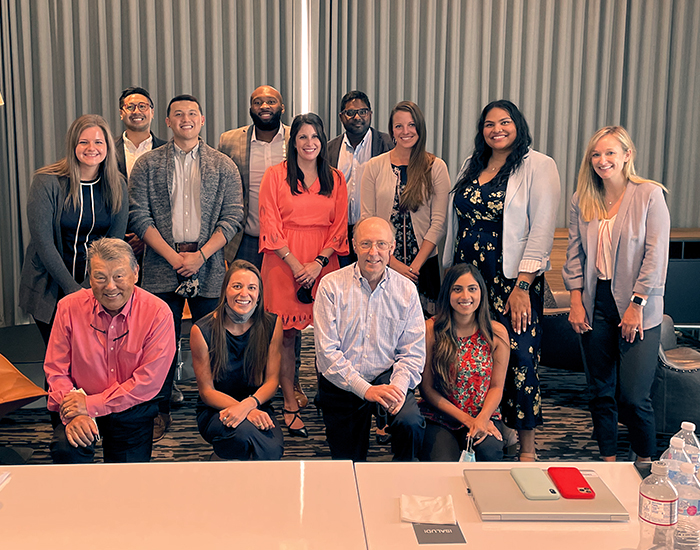KGI's School of Pharmacy and Health Sciences (SPHS) 24-month Biopharmaceutical Industry Fellowship Program provides hands-on training to Doctor of Pharmacy (PharmD) graduates in drug discovery, development, and commercialization, ultimately helping fellows build a successful career in the biopharmaceutical industry. This year, KGI has expanded the program, partnering with Ascendis Pharma (Oncology Clinical Development and Pharmacovigilance Regulatory Compliance), Pharmacyclics (Medical Affairs), Abbott Diabetes Care (U.S. Medical and Scientific Affairs), and Ortho Clinical Diagnostics (medical device development).
Since KGI began the fellowship program in 2018, all graduates have successfully landed industry positions—often with the company they work with during the program. For example, when KGI partnered with Profusa during the 2019-2020 academic year, fellows Taylor Noriega and Chloe Nguyen both obtained Manager positions with Profusa in Medical Affairs.
A valuable skill set that fellows bring to the companies is leading and delivering key projects, often offering an innovative approach. When developing clinical trials for Profusa, Noriega recognized the need for an app that would provide physicians with key information about the patients while preventing the company from knowing the patients' identity.
"Taylor created her own app with no coding experience," said Bernard Tyrrell, KGI's Associate Dean for Pharmacy and Industry Relations and Professor of Practice for Administrative Sciences, who runs the fellowship program. "She talked to the right people and got the whole thing pulled together, and it worked out really well."
Another fellow, Kaylee Miu, landed an assistant director position with AbbVie Pharmaceuticals immediately after completing the program.
"That was pretty significant, especially with a big company like AbbVie, which normally doesn't bring new hires in at that level," Tyrrell said.
The fellowship program is not exclusively offered to KGI graduates but is open to all PharmD graduates across the nation. Tyrrell believes this increases the respectability of the program, and for the KGI graduates who do end up getting a fellowship, it's more meaningful than if they had only been competing against their cohorts.
"Pharmaceutical companies want the best of the best."
"Back when I ran the same program for MCPHS University in Boston, some people criticized me for this and said we should only be offering the fellowship to our students, but if our students are better than anybody else's students, they'll get hired," Tyrrell said.
Additionally, having students from different schools and states in the program benefits the fellows as it offers a diversity of perspectives.
"You've got all these people with the same desire to be working in the industry from all over the country, bringing all their experiences together," Tyrrell said.
Although fellows spend the majority of their time working directly with the companies on various projects, the program still has an academic component where students complete curriculum and work under a KGI professor who acts as an academic preceptor.
Because fellowship programs are not intended to make large profits, it's essential that both the fellows and the companies are fully benefiting from the experience. Tyrrell meets with fellows regularly to ensure that the companies are providing quality training and education.
"I ask the fellows what projects they've been working on and whether or not they are living a balanced life," Tyrrell said. "I've actually fired companies in the past if they haven't been treating the fellows correctly."
At the same time, Tyrrell wants KGI PharmD students to know that a fellowship program is one potential route they can take but is not the only route to success. His former student Arian Farahani, PharmD '20, applied to several fellowships but did not obtain one, despite being an excellent student with a high GPA.
Farahani emailed Tyrrell to express his disappointment. Tyrrell asked Farahani what his ideal career would be, and Farahani stated that he wanted to be a medical science liaison. Tyrrell then contacted Michael Banks, a New York-based physician who recruits people for that very position, and sent him Farahani's CV.
"Next thing I know, Arian says, 'I just got hired as a medical science liaison for a company on the East Coast,'" Tyrrell said. "So here's someone who didn't get a fellowship but yet ended up getting hired for his ideal position right out of school."
Tyrrell also serves as Coordinator for the Medical and Clinical Affairs (MCA) Certificate for KGI PharmD students. The Certificate program is designed to offer students a competitive edge when applying for fellowships and industry positions as they explore strategic approaches to problem-solving in medical and clinical affairs, learn clinical research design and strategies, and pursue a variety of job opportunities available throughout the pharmacy program.
In 2019 and 2021, at least 60% of KGI's MCA students landed an industry position. It was difficult to obtain good numbers and feedback for the class of 2020 due to the pandemic. Even then, almost 40% successfully obtained a position.
Overall, both the certificate and the fellowship programs expose PharmD students to a variety of pharmaceutical professions—including industry positions.
"Most pharmacy schools have less than one percent of their graduates go into industry," Tyrrell said. "When I graduated many years ago, I was the only student out of my class to go into industry, and I went to work directly with Eli Lilly. So another thing that's nice about our programs is that they bring visibility to industry, since our graduates obtain these positions and then younger students realize they can do it, too."
